Question
Economists and politicians like Theodore Roosevelt and John Stuart Mill supported limiting the amount of money that could be bequeathed to heirs, arguing that inherited
Economists and politicians like Theodore Roosevelt and John Stuart Mill supported limiting the amount of money that could be bequeathed to heirs, arguing that inherited wealth plays less of a role in economic growth than funds from other sources. This is part of the reasoning behind the estate and other related taxes. Is it ethical for the government to limit the wealth a parent wants to bequeath to their children? Below are some possible points of view for you to agree or disagree with and to get you thinking.
*
It depends on how clear the link is between the source of funds (earned vs. inherited) and the effects on economic growth.
* Even if there's no good evidence that economic growth is weaker with large inheritances, the government should aim for more equality among citizens.
* No, taxes are for funding government activities, not manipulating heirs' wealth.
* No, the government should not have the right to do. These monies have already been taxed. This is double taxation.
Step by Step Solution
There are 3 Steps involved in it
Step: 1

Get Instant Access to Expert-Tailored Solutions
See step-by-step solutions with expert insights and AI powered tools for academic success
Step: 2

Step: 3

Ace Your Homework with AI
Get the answers you need in no time with our AI-driven, step-by-step assistance
Get Started


